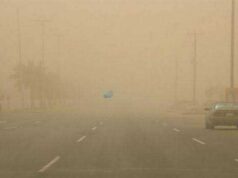BY IFEDOLAPO ADEMOSU
This week is a good week because on Wednesday, June 5th, 2024, and for the rest of the week we get to engage at so many levels about ways to make the earth sustainable. I celebrate all the stakeholders – those who are visible and many who are behind the scenes, playing some role in ensuring we leave the planet much better than we met it.
I celebrate all the milestones achieved. Chief among which is that today, we present a global united front as we address climate change, repairing the ozone layer, working at transiting into clean energy and phasing out carbon fuels, rescuing endangered species in countries around the world, dealing with plastic pollution and protecting the oceans and the ecosystems within. From Nigeria’s newly set up Presidential Committee on Climate Action and Green Economic Solutions, to concurrently running initiatives such as the green wall project battling desertification in the North, to the Nigeria Climate Change Act signed into law in 2021, to the beach adoption and cleanup, waste management and recycling collaborative projects run by non-government foundations like the Sterling one Foundation, we are well on our way. These and many more properly coordinated initiatives will go a long way in rescuing our planet from the crazy spin it has found itself in or the one we have put it in.
As we deliberate in our respective spaces and reel out the numbers of what has been achieved and what needs to be done, I encourage us to expand our focus beyond the figures because figures are more than mere numbers. They represent billions of lives on the planet! We must humanise the numbers by ensuring that everyone can see how they fit in plans to save the planet, no matter how far down the social ladder they are. Numbers mean something,
but sometimes only to the people analysing, the policy makers, and green project coordinators. To the farmer in the rural areas of the country, or the market woman in her small corner selling perishable food items, those numbers are just that -figures, except it is packaged and explained in a way that shows them how the numbers are relevant. It’s not just the numbers!
Many of us stumble through the science and statistics about the environment. Our attention then gets divided because we don’t understand how it has a bearing on our daily lives. This became very clear to me as I gathered data for my doctoral thesis which focused on environmental communication in selected broadcast stations in Nigeria. Comments from the respondents revealed why people (citizens) seem to be alienated from the climate action process. They are engrossed in the daily hustle and are confused as to how climate change and the ozone layer affects what they do at the bank, the project manager’s work at a sports complex somewhere in Abeokuta, or the market woman on the grind at Ogba market; how it affects the plumber trying to fit in a new pipe at his customers house somewhere in Lekki, the secretary at the government house or the fisherman on the seas somewhere in the Southeast of Nigeria.
In Ogun, NIPR leads charge against climate crisis
Many are even more oblivious of the relevance of the Climate Action bill signed into law under President Muhammadu Buhari in 2021, or the newly set up Presidential Committee on Climate Green Economic Solutions to their lives.
There was a respondent who stated categorically that the environment had nothing to do with him. The gentleman was an electrician, who lives and works in Abeokuta. He said that if it had to do with his job – yes he would be interested, but the ideas we were examining had nothing to do with him. Suffice to say he barely contributed throughout the discourse, but it showed me how so much of what we say and do as environmental advocates stay at a certain strata of society and gets lost in translation simply because of barriers like language, or even a lack of comprehension of the issues at play, or the importance and weight of such issues to our daily lives.
Another scenario was more common across the different focus groups that I engaged, and these groups had individuals across various strata of society in terms of age, gender, income, profession to mention a few. The respondents stated that they did not understand what some of the environmental issues discussed had to do with them personally. One individual, a retired pilot in her early fifties specifically stated that she did not understand what was expected of her just from watching the issues at play for some of the programmes they were exposed to. What role was she expected to play in helping to preserve the environment? These were her concerns, also shared by a few of the other respondents.
My take – as we discuss the numbers, and the targets, let’s remember to drill down to all aspects of society using the language and contexts they understand. Let’s show them how much the environment (and stakeholders) need them to participate in preserving and protecting it if you will. The more people taking positive action, the better for the earth, the better for us.
Participation starts from ownership. If we have learnt anything from sustainable development, people take ownership of projects only when they feel it is theirs, and they see how it benefits them to participate. Let’s show everyone how they fit into this equation…
Happy Deliberations, Happy Celebrations!
*Ifedolapo is a lecturer at the Department of Mass Communication, Caleb University, and the Assistant General Secretary of the Association of Communication Scholars & Professionals of Nigeria.
- Rivers, Kaduna, Ekiti, Ondo CPs, 7 others promoted AIGs, PSC approves 16 CPs - December 16, 2024
- Otuaro: Entrenching enduring peace in Niger Delta - December 16, 2024
- Fraud: EFCC arrests 792 Nigerians, Chinese, Filipinos in Lagos edifice - December 16, 2024










